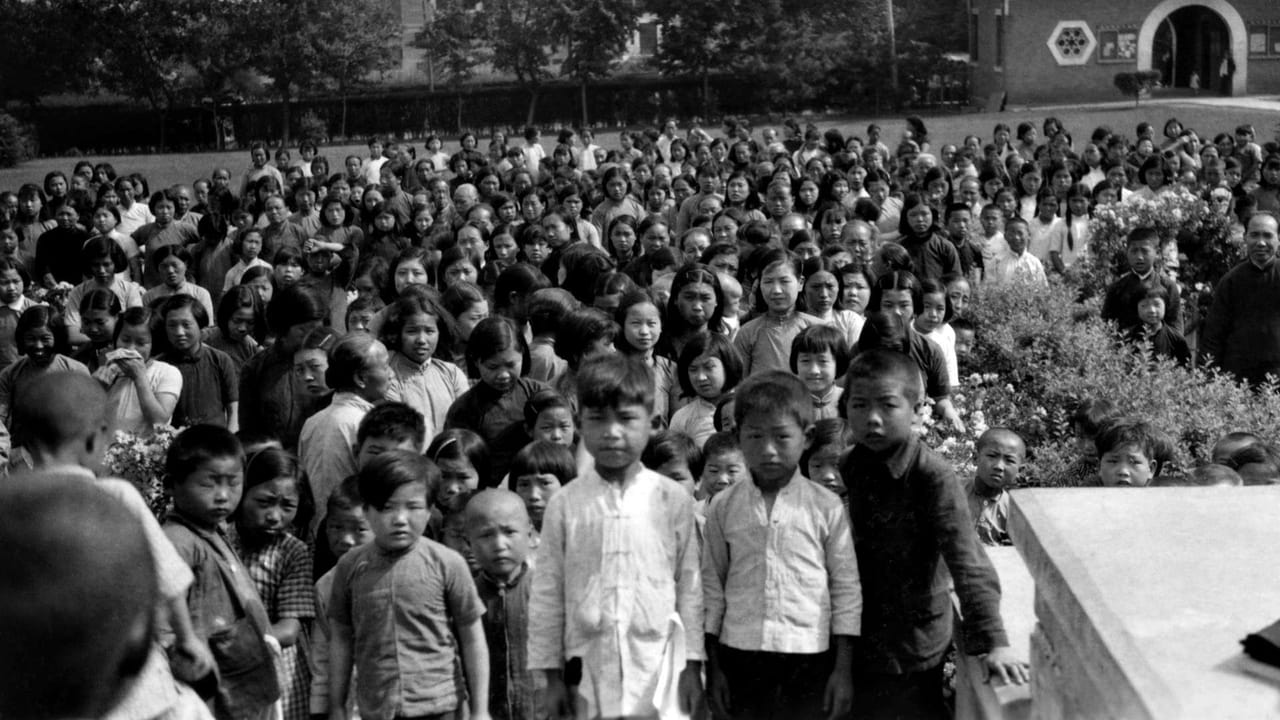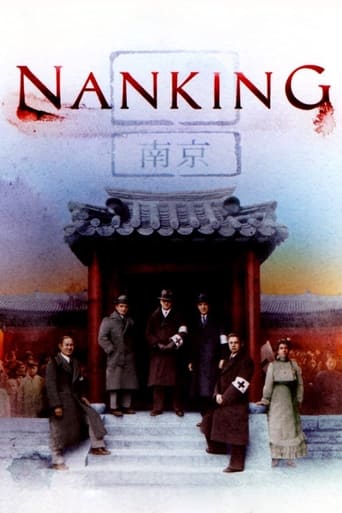



Very very predictable, including the post credit scene !!!
View MoreThis is one of the few movies I've ever seen where the whole audience broke into spontaneous, loud applause a third of the way in.
View MoreUnshakable, witty and deeply felt, the film will be paying emotional dividends for a long, long time.
View MoreThe movie is surprisingly subdued in its pacing, its characterizations, and its go-for-broke sensibilities.
View MoreNearly seven decades after what was deemed one of the most despicable and inhumane acts ever inflicted by Man on fellow men, the issue of 'the rape of Nanking' has neither been justifiably debated nor has it been sufficiently brought to rest. The spectres of the massacre still live among us, refusing to be appeased. The next couple of years will see a spate of documentaries and feature films depicting one way or another on the subject. Nanking is the first to tackle the issue, its aim to separate fact from fiction. Nanking allows us to view the horrendous events in chronological order, an effective method that is both clear and concise. Using first-hand accounts of survivors as well as real footages of war crimes committed, viewers get a bitter taste of what's like during arguably the darkest period in modern Chinese history. The subject matter remains overwhelmingly depressing, despite the efforts of the filmmakers in introducing another aspect of the Nanking story – great Westerners who banded together in a successful bid to save as many Chinese from intolerable suffering as possible. Nanking could have been an influential film; however it lets itself down in crucial areas – narrative technique and pacing. Using actors to impersonate the above-mentioned heroes by gathering them together in a room to account for their experiences of the Nanking massacre is a bad move by the filmmakers. It loses its credible touch even before the final third and with the combination of poor pacing, results in a documentary that's one of the weakest of 2007. No doubt it's an important and timely film, but I would rather have Michael Moore anytime. GRADE: C+ (www.filmnomenon.blogspot.com) All rights reserved.
View MoreIn 1937, the Japanese army invades China in a cruel war and after the fall of Shanghai, the soldiers head to the capital Nanking. A group of Western foreigners led by John Rabe, Minnie Vautrin, Bob Wilson and George Fitch create the Safety Zone, a sanctuary that was not bombed by the Japanese airplanes, to protect thousands of refugees. While the Japanese soldiers reach the town on 13 December 1937, raping, slaughtering and pillaging the civilian, the heroic group of Westerns defends the lives of about 250,000 Chinese sacrificing their own freedom, and succeeds to tell the world the crimes of war committed by the Japanese army in Nanking.The harrowing, heartbreaking and awesome "Nanking" retells the story of the genocide in Nanking in 1937 promoted by the Japanese army. In the late 90's I saw the also impressive and disturbing "Nanjing 1937" (a.k.a. "Don't Cry, Nanking") and I confess that was the first time I heard anything about this massacre. In the movie "Shake Hands with the Devil", the Canadian General Romeo Dellaire has a fantastic line when he says that "genocide is when there are cargo train, concentration camps, gas chambers". In Hollywood, usually genocide is associated to the Jews in World War II and there are dozens of excellent movies about this dark period of the contemporary history. "Nanking" uses letters and other documents written mainly by the group of Westerns that created the Safety Zone in touching and emotional lectures of great actors and actresses; disturbing and heartbreaking testimonies of survivors; a great number of footages, in a magnificent work of research; and the wonderful music score of Kronos Quartet. I immediately associated how traumatic might have been the lives of these survivors after witnessing such cruel crimes of war. Further, in Nanking there were Westerns observers that told the world part of what happened in the city; imagine in Shanghai and in the minor towns in the countryside on the way of the Japanese troops without foreign witnesses how violent these soldiers might have been with the population. These group of expatriated shows the difference that an individual can make. I was really disturbed and sad after watching this fantastic movie. My vote is nine.Title (Brazil): Not AvailableNote: On 24 May 2013 I saw this documentary again.
View More"Nanking" (documentary, 2007): When we think of Evil and War, we think first of the Nazis, Germany, and Jews. Though this is simplistic, we at least have these household terms as points of reference. We HATE everything around the names Nazi, Swastika, and Hitler. What our history has failed to do is discuss the Japanese at and before that same era with their attacks upon China, and, how they were no less brutal than the Nazis. Ill even go further than that and say their blood lust was more brutal, random, passionate, and less calculating than the Nazis. WHY we, as Americans, have allowed our history to be written so clearly and sharply about the Germans, yet so vaguely and softly about the Japanese, is a question I suspect has embarrassing answers. See this documentary. It wont answer all your questions, but it will initiate them.
View MoreI went to the movie with an open mind, to see evidences presented by the film maker about the truth of Nanking, 1937. In November 2007, I visited Japan and was impressed with the people, how polite, so sweet, it is no wonder that the current Japanese people refused to believe Nanking massacre did happen. In this movie, I found the following background information that was seldom mentioned . Most rich people had already fled Nanking, leaving the poor to fend for themselves.Then the Chinese army retreated from Shanghai, the "front" that supposedly protected Nanking. Instead of fighting to the last stand, thousands of Chinese militarizes hided themselves among the civilians. I am Chinese and it doesn't make me proud to see thousands of soldiers simply allowed the Japanese to tie them up for execution, without putting much of a fight.In Japan, men were free to visit prostitutes, to satisfy their basic needs.In the end, the rape and killing stopped when the Japanese got their comfort women camp staffed and they had rounded up most of the hidden soldiers and lots of civilians mistaken as soldiers. The documentary shown enough information for me to understand what , how, when the massacre took place. Too bad there is no Oscar.
View More